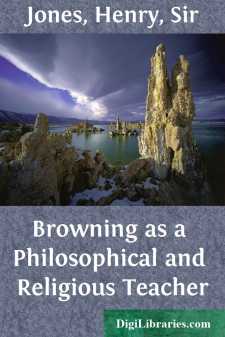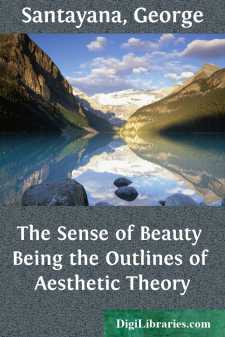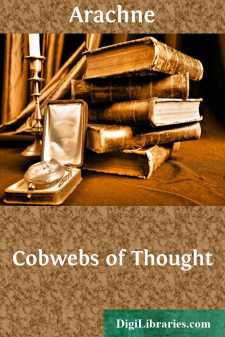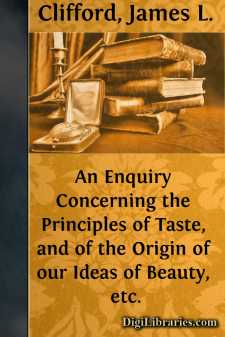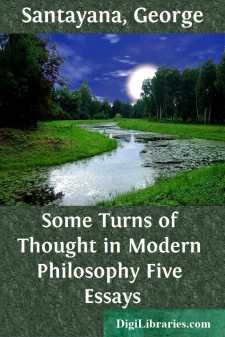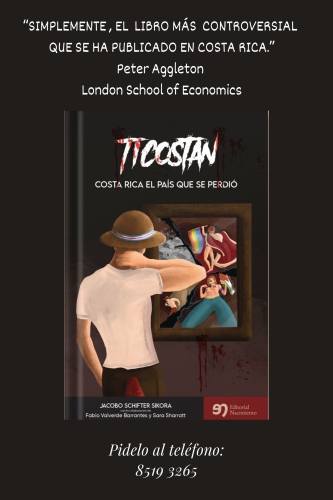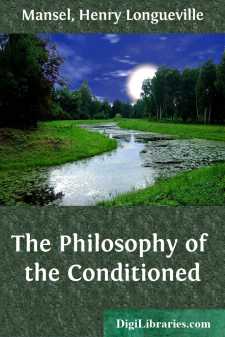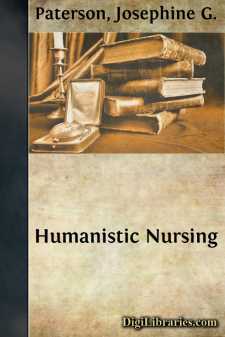Philosophy
- Aesthetics 11
- Eastern 1
- Ethics & Moral Philosophy 2
- General 30
- Hindu 2
- History & Surveys 3
- Logic 1
- Metaphysics 3
- Political 1
- Religious 7
- Social 3
- Taoist 1
Philosophy Books
Sort by:
by:
Henry Jones
CHAPTER I. INTRODUCTION. "Grau, theurer Freund, ist alle Theorie, Und grün des Lebens goldner Baum." (Faust.) There is a saying of Hegel's, frequently quoted, that "a great man condemns the world to the task of explaining him." The condemnation is a double one, and it generally falls heaviest on the great man himself, who has to submit to explanation; and, probably, the last...
more...
by:
George Santayana
PREFACE This little work contains the chief ideas gathered together for a course of lectures on the theory and history of aesthetics given at Harvard College from 1892 to 1895. The only originality I can claim is that which may result from the attempt to put together the scattered commonplaces of criticism into a system, under the inspiration of a naturalistic psychology. I have studied sincerity...
more...
by:
Arachne
I. OUR IGNORANCE OF OURSELVES. Self-Analysis, apart from its scientific uses, has seldom rewarded those who have practised it. To probe into the inner world of motive and desire has proved of small benefit to any one, whether hermit, monk or nun, indeed it has been altogether mischievous in result, unless the mind that probed, was especially healthy. Bitter has been the dissatisfaction, both with the...
more...
INTRODUCTION Since the early nineteenth century it has been known that Frances Reynolds, the sister of Sir Joshua, was the author of an essay on taste, which she had printed but did not publish. Yet persistent search failed to turn up a single copy. It remained one of those lost pieces which every research scholar hoped someday to discover. In 1935 it appeared that the search was over. Among some...
more...
by:
George Santayana
I A good portrait of Locke would require an elaborate background. His is not a figure to stand statuesquely in a void: the pose might not seem grand enough for bronze or marble. Rather he should be painted in the manner of the Dutch masters, in a sunny interior, scrupulously furnished with all the implements of domestic comfort and philosophic enquiry: the Holy Bible open majestically before him, and...
more...
by:
Jacobo Schifter
Un libro polémico acerca de los mitos sobre el país de "Pura Vida" que abarca una crítica mordaz a la cultura woke y al movimiento lbgtq.
THE PHILOSOPHY OF THE CONDITIONED. The reader of Plato’s Republic will readily recall to mind that wonderful passage at the end of the sixth book, in which the philosopher, under the image of geometrical lines, exhibits the various relations of the intelligible to the sensible world; especially his lofty aspirations with regard to “that second segment of the intelligible world, which reason of...
more...
Out of necessity nursing, as a profession, reflects the qualities of the culture in which it exists. In our culture for the past quarter of a century nursing has been assailed with rapid economic, technological, shortage- abundance, changing scenes' vicissitudes. In the individual nurse these arouse turmoil and uncertainty. These cultural stirrings inflame that part of the nurse's spirit...
more...
PERCY BYSSHE SHELLEY, AS A PHILOSOPHER AND REFORMER. A PAPER READ BEFORE THE NEW YORK LIBERAL CLUB, ON FRIDAY, AUGUST 6TH, 1875. "Let us see the Truth, whatever that may be."—SHELLEY, 1822. Mr. Vice-President and Members of the Liberal Club: "The Blood of the Martyr is the Seed of the Church." Persecution ever fails in accomplishing its desired ends, and as a rule lays the...
more...
PROLOGUE What I am anxious to attempt in this anticipatory summary of the contents of this book is a simple estimate of its final conclusions, in such a form as shall eliminate all technical terms and reduce the matter to a plain statement, intelligible as far as such a thing can be made intelligible, to the apprehension of such persons as have not had the luck, or the ill-luck, of a plunge into the...
more...


